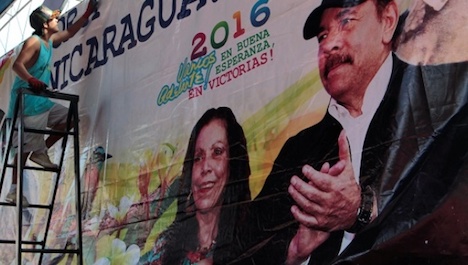Western media, NGOs and governments are waging a psychological warfare campaign against the country’s Sandinista government. Every time Nicaragua faces elections, this small, impoverished country is subjected to intense scrutiny by Western governments and media. This year’s national elections are no exception. As in previous years, Western media, NGOs and governments are waging a psychological warfare campaign against the country’s Sandinista government led by President Daniel Ortega. As usual, inaccurate criticism and deliberate misrepresentation of the country’s electoral system abound. But national opinion polls all forecast an overwhelming victory for Ortega as President and for the Sandinista Front for National Liberation, or FSLN, in the legislature. The main issue is not whether Daniel Ortega and the FSLN will win, or by how much, but whether some sections of the local and regional right wing, dependent on political support from the United States, will be able to discredit the elections’ legitimacy. Six political alliances and parties will contest the presidential elections, while seven will contest the legislative elections. At the moment over 80% of people polled say they will definitely or probably vote. Among those voters, the FSLN as a party is polling regularly at levels of about 60% support, the opposition parties at around 10%, uncommitted voters at about 30%. That means Daniel Ortega, whose personal popularity is around 79% is likely to be re-elected President with at least 70% of the vote. The FSLN is likely to slightly increase it’s already solid control of the country’s National Assembly at the cost of the bitterly divided opposition parties who long ago lost the support of their natural allies in Nicaragua’s business classes. The following factors explain why President Ortega and his partner Rosario Murillo as well as the FSLN party they lead are so popular even after ten years in government:
Neither Nicaragua’s political opposition nor their foreign backers have any coherent alternative to this powerful combination of political, economic and social factors supporting President Ortega and the FSLN. For their part, the right wing parties legitimately contesting the November 6th elections have avoided being cast as pawns of US policy. The sector of Nicaragua’s political opposition worst affected by the collapse in support for Nicaragua’s right wing generally has been that of ex-Sandinistas allied with corruption-tainted banker and perennial loser Eduardo Montealegre and other less well-known right wing politicians. Now, even that tiny faction, grandiosely calling itself the National Coalition for Democracy, has split into a group called Citizens for Freedom and another composed of ex-Sandinistas called the Broad Front for Democracy. These self-styled democrats have proved they are incapable of organizing a successful political project of their own. Even among themselves, they admit no dissent, and persistently blame their failure on Daniel Ortega and their right wing rivals. Their only political option is to appeal for outside intervention to try and delegitimize the elections next Nov. 6. As veteran U.S. solidarity activist Chuck Kaufman has pointed out, the ex-Sandinistas and their equally marginal right wing allies have openly lobbied in the US to cut off development loans to Nicaragua. The imperial US elites and their pawns are calling into question Nicaragua’s electoral system. They have openly proclaimed a psychological warfare campaign with the slogan “There’s no one to vote for!” to try and invalidate this year’s elections altogether, as they did in 2008. Back then they falsely and unsuccessfully proclaimed that year’s municipal elections invalid while at the same time refusing, in Managua the capital, to accept a recount they themselves demanded. This year they claim the national elections are invalid because, through their own political, legal and administrative incompetence, they lost control of their preferred political party, the Independent Liberal Party (PLI), to right wing rivals. They claim a lack of national and foreign electoral observers will invalidate the result. But 5000 national observers from Nicaragua’s universities will monitor the process, which will also be accompanied by impeccably impartial and distinguished foreign electoral experts from across Latin America and the Caribbean. They claim Daniel Ortega’s wife Rosario Murillo should not be Ortega’s vice-presidential candidate, even when opinion polls have shown Murillo’s national popularity at well over 70 percent for years now. In any other country, no one would pay the least attention to a tiny right wing clique polling less than 1 percent support nationally crying fraud at political rivals polling levels of personal approval of over 70 percent year after year. But in Nicaragua’s case all the usual suspects are supporting this latest deadbeat political gambit by a minuscule clique of anti-democratic, narcissistic, unpatriotic sell-outs. US right wingers like terrorist supporters Ileana Ros Lehtinen and Marco Rubio have pledged support. NGOs like the Washington Office on Latin America parrot almost identical attacks on Nicaragua’s electoral system and government. But they all struggle maladroitly to reconcile the contradiction between massive popular support for Daniel Ortega, Rosario Murillo and the Sandinista party with allegations of repression and a trend towards dictatorship. The Organization of American States showed every sign of wanting to support efforts to delegitimize Nicaragua’s elections. Alert to the danger, President Ortega invited the OAS to Nicaragua to dialog on the electoral process and related political matters. OAS General Secretary Luis Almagro, himself flagrantly interventionist towards Venezuela and Nicaragua, could hardly refuse without losing all credibility. Thus, the OAS will not be observing the elections and has been forced to acknowledge the Nicaraguan government as a partner whose sovereignty they have to respect. The real losers in Nicaragua’s elections will not be the almost certain to be defeated right wing candidates, but the tiny clique of extremist right-wingers, including many ex-Sandinistas, who hoped in vain to engineer international dismissal of Nicaragua’s election results. Source URL |
